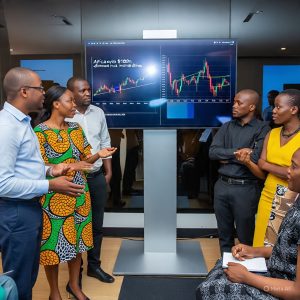Onome Amuge
A digital trade boom sweeping across Africa is projected to generate a $180 billion economy by 2025, a significant jump from the $115 billion recorded just five years prior. This growing online marketplace is increasingly viewed as pivotal in unlocking tangible industrial growth and forging stronger commercial ties across the continent’s diverse markets.
The African Continental Free Trade Area (AfCFTA), uniting 55 nations with a combined GDP of $3.4 trillion and a population of 1. billion, has laid the groundwork for unprecedented levels of intra-African commerce. However, the practical complexities of sourcing materials, managing logistics, and payment operations across disparate regulatory environments remain hindrances for industrial players seeking to capitalise on this vast potential.
Jumoke Oduwole, Nigeria’s minister for industry, trade & investment, underscored the transformative power of this digital shift. “Digital trade is significantly boosting Africa’s GDP, creating vital new employment opportunities, and fostering greater regional commerce,” she stated. “This digital evolution is paving the way for genuine economic expansion, the creation of productive jobs, and a reduction in poverty levels,” she stated.
Mudiaga Mowoe, founder and chief executive of Matta, an African integrated trade ecosystem, believes a unified approach is crucial to realising this potential. “Building on this rapid expansion, the focus must now shift from fragmented digital initiatives towards a fully integrated ecosystem capable of streamlining every facet of trade – from initial sourcing to final payment,” he told the Financial Times. “Matta’s platform aims to alleviate sourcing challenges for manufacturers and simplify cross-border complexities for suppliers, ultimately unlocking new African markets in real time through this holistic integration,” Mowoe said.
To this end, Matta’s platform currently encompasses a digital marketplace and a logistics management tool, Flux, with plans to soon incorporate Oxide Finance, a trade financing and cross-border payments solution. The company argues its end-to-end approach, targeting sectors from food and beverage to construction, is designed to enhance, rather than replace, existing trade networks by providing improved visibility, traceability, and transaction efficiency.
The critical role of digital solutions in advancing African industrialisation will be a key discussion point at the upcoming West Africa Industrialisation, Manufacturing & Trade (West Africa IMT) Summit and Exhibition, scheduled for October 21-23, 2025. The event will bring together government officials, investors, manufacturers, and technology innovators to develop practical strategies and policy frameworks aimed at accelerating the continent’s industrial transformation.
Matta is set to participate alongside other leading industry stakeholders, highlighting the significant opportunities for industrial growth within the West African sub-region. As manufacturers increasingly seek innovative and efficient methods to enhance production beyond traditional infrastructure and policy support, the need for systems that simplify procurement, improve transparency, and ensure reliable supply chains is becoming increasingly pressing.
According to analysts, digital platforms like Matta are tackling these multifaceted challenges by integrating procurement, logistics, payment processing, and data-driven planning capabilities. By embedding these tools within industrial operations, West African economies, and the broader African continent, stand to accelerate their development timelines and establish competitive manufacturing hubs capable of effectively participating in global markets.
As African nations increasingly forge their own economic paths, the growth and adoption of digital trade platforms will be instrumental in determining the speed and effectiveness of new industrial development. The digital transformation of African trade is seen to be rapidly gaining momentum, promising to reshape economic relationships across the continent for years to come.









